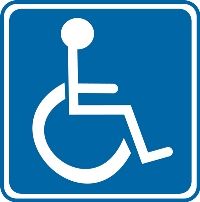Disabilities Act lawsuit abuse divides activists
May 10, 2012
By Katy Grimes
Lawsuit abuse is a growing problem in California, but none is more prevalent than disability access lawsuits and the financial damage they cause to California businesses.
Several state lawmakers are trying to address the lawsuit abuse with new legislation, but this has raised the ire of disability activists.
A very long and arduous hearing was held this week in the Senate Judiciary Committee, in which many disability activists found themselves on opposite sides of a new bill.
Using the legal system for personal gain
In recent years, some California disability activists have abused the ADA by filing thousands of frivolous lawsuits against small and large business in a shakedown for money, rather than encouraging businesses to provide better access to the disabled.
Because there are more than 2,400 provisions in California alone pertaining to disability access in businesses and public areas, no one seems to actually know what the legal standards are, other than some of the more obvious wheelchair requirements. This has allowed many mean-spirited activists to take advantage of the deep, and not-so-deep pockets of businesses.
ADA lawsuit abuse bill
Senate President Pro Tem Darrell Steinberg, D-Sacramento, and Sen. Bob Dutton, R-Rancho Cucamonga, co-authored SB 1186 in an effort to assist California businesses in the complex compliance issues with the requirements of the Americans With Disabilities Act, without facing the threat of a lawsuit.
SB 1186 was originally authored only by Dutton. It addressed businesses “right to cure” before a lawsuit could go forward, meaning the business owner could fix the problem before legal action was gaken.
But Steinberg said that he knew the bill would be killed, so he jumped in to co-author SB 1186. The bill was modified to appease disability advocates, who feared changes to the provisions would seriously weaken rights under the State’s Unruh Civil Rights Act for people with disabilities.
Amendments already taken in SB 1186 propose to prohibit anyone, including persons with disabilities and their lawyers, from sending a “demand for money” letter to a business. SB 1186 would also require that any attorney intending to file a federal or state ADA claim for damages must send the business a notice of the alleged violations 30 days prior to being able to file any lawsuit for damages.
Activists divided
The largest hearing room at the Capitol was filled to capacity on Tuesday with members of the disabled community, small business representatives and business associations. “We live in fear,” said one small business owner who owns a Bed and Breakfast Inn. “Small businesses are disabled by disability predators.”
While some disability activists openly discounted the concerns of businesses, others said that the legal process was in the way of the ultimate goal. “We don’t need more lawsuits. We need more access,” explained a woman confined to a wheelchair.
But there was a group of disability activists at the hearing who openly expressed their anger about the bill.
“I want it all—I am like everyone else,” said one activist confined to a wheelchair. “This is not a poor small business problem.” The woman said that she is currently looking for a state job and as she visits different state agencies, the lack of wheelchair access makes it very difficult for her.
From the back of the hearing room, two wheelchair-bound women complained loudly about not being able to easily access the hearing room dais in order to testify. When a sergeant offered to bring them a cordless microphone, they only spoke louder and nastier to those standing near the aisles, as they shoved their way toward the front of the room.
People stepped aside to make room for both of them to pass, but those gestures were only met with more scorn. “Get out of my way,” said Ruthee Goldkorn, a well known wheelchair-bound disability rights activist, who has been the plaintiff in many disability access lawsuits throughout California.
Goldkorn is the vice president of the Californians for Disability Rights Foundation. When a woman jumped up to move a very large wheelchair-bound man from the aisle, Goldkorn yelled several times, “He’s not in the way.” She navigated around him, and then aimed her wheelchair right at someone pressed up against the wall, who was trying to make room for her to pass.
What’s so interesting is that audience members at this hearing were not policed or made to sit in the auditorium seats, as they were in a recent hearing in the same room on another matter not related to disabilitiesw. At that hearing on April 17, hundreds of people also appeared to testify in opposition to a controversial mandatory vaccination bill, but were aggressively forced to sit, or made to leave the room. This was not the case with the ADA bill this week.
“It would be nice if the Capitol actually had wheelchair access,” Linda Hinchey yelled to no one in particular. Hinchey, sitting with Goldkorn, is the vice president of the Californians for Disability Rights.
But the room has very wide aisles, and public testimony is often given from a microphone on the floor near the audience.
Goldkorn used some salty language and called a couple of women nasty names, when they tried to offer her assistance.
Perhaps it is tiresome and offensive constantly being offered assistance from well-meaning people, but Goldkorn was just churlish and rude.
When she testified, Goldkorn mocked business owners’ confusion over the ADA laws, and said that businesses had no right to claim they weren’t aware of the laws, which have been around for several decades.
In a recent story about the earlier version of Dutton’s bill, Goldkorn asked, “Why do I have to tell them? It’s a huge problem if people are so stupid that they don’t know they need a blue parking space.”
Goldkorn testified that access for the disabled is a civil rights issue and should not take a backseat behind what’s best for small businesses. “I am opposed to the current version of the bill,” Goldkorn said. “I want a place at the table with every disability represented.”
Goldkorn explained to the committee that inches matter differently to each type of disability. And then she warned, “We can put people out of business.”
Perhaps the most compelling testimony came from Peter Mendoza, who has cerebral palsy and also uses a wheelchair. Mendoza is well known for his long history of advocacy for the rights of people with disabilities, but said he could not support SB 1186 yet because more input from the disabled was needed.
Mendoza said that attention should be refocused on city and county building departments, which have been approving faulty building plans since 1982, when California’s ADA law was passed. “Until building department officials enforce access, we will have problems with disability access,” Mendoza said.
“We have many experts that can help you, with sound ideas,” Mendoza offered to Steinberg and Dutton.
Americans With Disabilites Act
Since its passage by Congress in 1990, the Americans with Disabilities Act has addressed the unique needs of individuals with disabilities and medical conditions. The ADA guarantees free access to roadways, sidewalks, buildings and facilities which are open to the public, along with hospitals and medical facilities, and housing.
Ironically, many government buildings are also in violation of the federal and state ADA laws. However, in order for a lawsuit to be filed against a government agency or entity, a pattern of negligence must first be shown.
Ending lawsuit Abuse
Steinberg said that he and Dutton felt it was necessary to get the bill moving, knowing that this would likely be a year-long process. “There is no danger of this being jammed quickly through the process,” Steinberg assured the audience.
“People don’t know that there are 2,400 items to comply with,” added Dutton. “Nobody knows what to do.”
Federal ADA law changes are expected to go into effect in 2013, which will put some of California’s ADA laws in direct conflict. That’s another reason why so many ADA lawsuit reform bills are currently in the Legislature.
While disabled activists say that the courts are the only option available to them, others say that litigation is not leading to better access.
Steinberg agreed. “We need to find some way where somebody is not denied access, but a building code is not violated,” he said.
It is anticipated that SB 1186 will be amended as it progresses in the Legislature, as all parties impacted have a chance to provide input.
Supporters of SB 1186 include the Independent Grocers Association, the California Restaurant Owners Association, the California Business Properties Association, the Building Owners and Managers Association of California, NAIOP of California, the Commercial Real Estate Development Association International Council of Shopping Centers the California Hospital Association and the National Federation of Independent Business.
“Amenities are being removed instead of being fixed,” one business representative testified at the hearing.
Opposition comes from the California Foundation for Independent Living Centers, Disability Rights California and the Disability Rights Education & Defense Fund.
“Sen. Steinberg and I have had some very extensive talks about this issue of predatory lawsuits, which are being filed under the ADA,” Dutton said. “Both of us agree that this is a serious problem that needs to be addressed. I’m hopeful we’ll be able to finally fix this problem that has plagued thousands of small businesses throughout California, while at the same time protect the rights of the disabled community.”
Other bills introduced to address the frivolous lawsuits and legal abuse:
AB 2325 (Norby): Special access: liability.
SB 1163 (Walters): Special access: liability.
Related Articles
LAUSD does not compute
What’s it with governments and computers? The latest cyber-snafu strikes the LAUSD, reported the Times: “the Los Angeles Unified School
Leg Wants to Regulate Cough Syrup
Ali Meyer: It’s Lil Wayne’s drug of choice. Kids call it robo-tripping. Cough syrup isn’t just for colds anymore. State
Bill Puts CA Med Insurance in ER
JUNE 6, 2011 By KATY GRIMES Tough new state medical insurance regulations could pull the plug on the plans held




